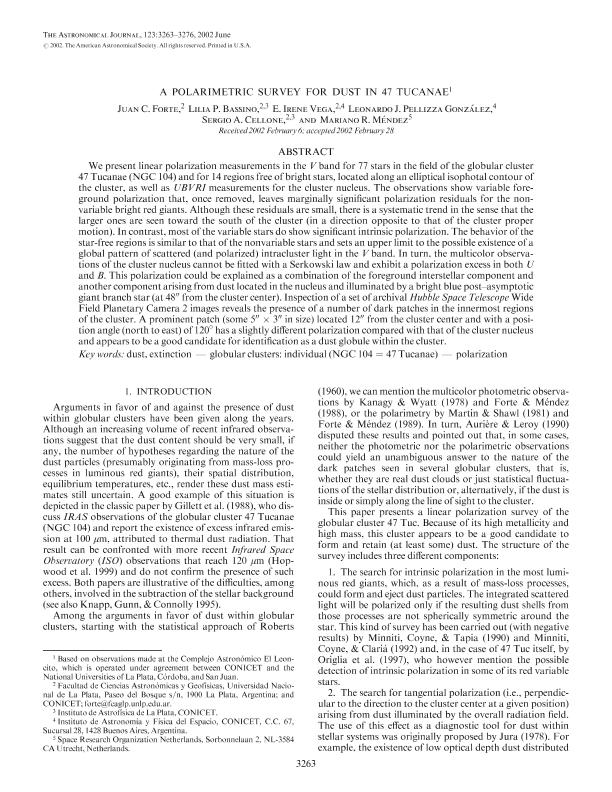Mostrar el registro sencillo del ítem
dc.contributor.author
Forte, Juan Carlos

dc.contributor.author
Bassino, Lilia Patricia

dc.contributor.author
Vega, Ema Irene

dc.contributor.author
Pellizza González, Leonardo Javier

dc.contributor.author
Cellone, Sergio Aldo

dc.contributor.author
Méndez, Mariano R.
dc.date.available
2018-02-26T21:10:00Z
dc.date.issued
2002-12
dc.identifier.citation
Forte, Juan Carlos; Bassino, Lilia Patricia; Vega, Ema Irene; Pellizza González, Leonardo Javier; Cellone, Sergio Aldo; et al.; A polarimetric survey for dust in 47 Tucanae; IOP Publishing; Astronomical Journal; 123; 6; 12-2002; 3263-3276
dc.identifier.issn
0004-6256
dc.identifier.uri
http://hdl.handle.net/11336/37181
dc.description.abstract
We present linear polarization measurements in the V band for 77 stars in the field of the globular cluster 47 Tucanae (NGC 104) and for 14 regions free of bright stars, located along an elliptical isophotal contour of the cluster, as well as UBVRI measurements for the cluster nucleus. The observations show variable foreground polarization that, once removed, leaves marginally significant polarization residuals for the nonvariable bright red giants. Although these residuals are small, there is a systematic trend in the sense that the larger ones are seen toward the south of the cluster (in a direction opposite to that of the cluster proper motion). In contrast, most of the variable stars do show significant intrinsic polarization. The behavior of the star-free regions is similar to that of the nonvariable stars and sets an upper limit to the possible existence of a global pattern of scattered (and polarized) intracluster light in the V band. In turn, the multicolor observations of the cluster nucleus cannot be fitted with a Serkowski law and exhibit a polarization excess in both U and B. This polarization could be explained as a combination of the foreground interstellar component and another component arising from dust located in the nucleus and illuminated by a bright blue post-asymptotic giant branch star (at 48″ from the cluster center). Inspection of a set of archival Hubble Space Telescope Wide Field Planetary Camera 2 images reveals the presence of a number of dark patches in the innermost regions of the cluster. A prominent patch (some 5″ 3″ in size) located 12″ from the cluster center and with a position angle (north to east) of 120° has a slightly different polarization compared with that of the cluster nucleus and appears to be a good candidate for identification as a dust globule within the cluster.
dc.format
application/pdf
dc.language.iso
eng
dc.publisher
IOP Publishing

dc.rights
info:eu-repo/semantics/openAccess
dc.rights.uri
https://creativecommons.org/licenses/by/2.5/ar/
dc.subject
Dust, Extinction
dc.subject
Globular Clusters: Individual (Ngc 104 = 47 Tucanae)
dc.subject
Polarization
dc.subject.classification
Astronomía

dc.subject.classification
Ciencias Físicas

dc.subject.classification
CIENCIAS NATURALES Y EXACTAS

dc.title
A polarimetric survey for dust in 47 Tucanae
dc.type
info:eu-repo/semantics/article
dc.type
info:ar-repo/semantics/artículo
dc.type
info:eu-repo/semantics/publishedVersion
dc.date.updated
2018-02-19T16:56:16Z
dc.journal.volume
123
dc.journal.number
6
dc.journal.pagination
3263-3276
dc.journal.pais
Reino Unido

dc.journal.ciudad
Londres
dc.description.fil
Fil: Forte, Juan Carlos. Consejo Nacional de Investigaciones Científicas y Técnicas; Argentina. Universidad Nacional de la Plata. Facultad de Ciencias Astronómicas y Geofísicas; Argentina
dc.description.fil
Fil: Bassino, Lilia Patricia. Consejo Nacional de Investigaciones Científicas y Técnicas. Centro Científico Tecnológico Conicet - La Plata. Instituto de Astrofísica La Plata. Universidad Nacional de La Plata. Facultad de Ciencias Astronómicas y Geofísicas. Instituto de Astrofísica La Plata; Argentina
dc.description.fil
Fil: Vega, Ema Irene. Universidad Nacional de la Plata. Facultad de Ciencias Astronómicas y Geofísicas; Argentina. Consejo Nacional de Investigaciónes Científicas y Técnicas. Oficina de Coordinación Administrativa Ciudad Universitaria. Instituto de Astronomía y Física del Espacio. - Universidad de Buenos Aires. Facultad de Ciencias Exactas y Naturales. Instituto de Astronomía y Física del Espacio; Argentina
dc.description.fil
Fil: Pellizza González, Leonardo Javier. Consejo Nacional de Investigaciónes Científicas y Técnicas. Oficina de Coordinación Administrativa Ciudad Universitaria. Instituto de Astronomía y Física del Espacio. - Universidad de Buenos Aires. Facultad de Ciencias Exactas y Naturales. Instituto de Astronomía y Física del Espacio; Argentina
dc.description.fil
Fil: Cellone, Sergio Aldo. Consejo Nacional de Investigaciones Científicas y Técnicas. Centro Científico Tecnológico Conicet - La Plata. Instituto de Astrofísica La Plata. Universidad Nacional de La Plata. Facultad de Ciencias Astronómicas y Geofísicas. Instituto de Astrofísica La Plata; Argentina. Universidad Nacional de la Plata. Facultad de Ciencias Astronómicas y Geofísicas; Argentina
dc.description.fil
Fil: Méndez, Mariano R.. Space Research Organization Netherlands; Países Bajos
dc.journal.title
Astronomical Journal

dc.relation.alternativeid
info:eu-repo/semantics/altIdentifier/url/http://iopscience.iop.org/article/10.1086/340471
dc.relation.alternativeid
info:eu-repo/semantics/altIdentifier/doi/http://dx.doi.org/10.1086/340471
Archivos asociados
